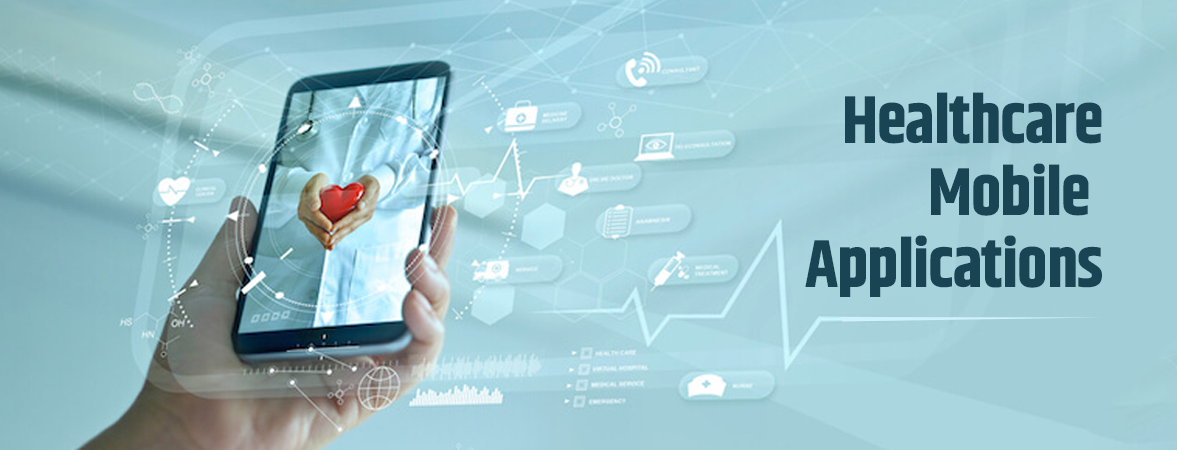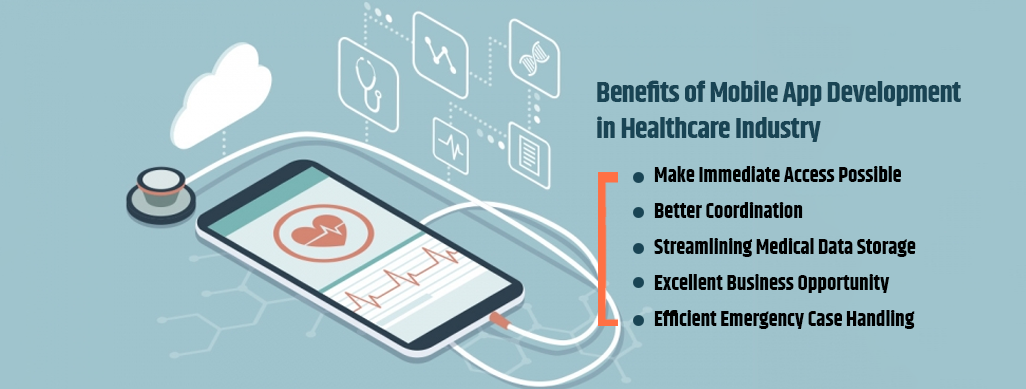
We use cookies to ensure that we give you the best experience on our website.
By using this site, you agree to our use of cookies. Find out more.
In this blog, we will discuss the different types of healthcare mobile applications and explore how their development benefit organizations and individuals in groundbreaking ways.

The healthcare sector has undergone tremendous transformation with innovation in Mobile App Development technologies. Today, smartphones have become an indispensable tool in our lives and people are increasingly relying on apps for various purposes. This has opened up opportunities for mobile apps to revolutionize the way healthcare services are delivered. From facilitating on-demand access to medical records to aiding emergency responses, healthcare apps are streamlining operations and improving patient outcomes.
In this blog, we will discuss the different types of healthcare mobile applications and explore how their development benefit organizations and individuals in groundbreaking ways. We will look at key advantages like enhanced access, coordination, data management and business prospects. The objective is to understand how mobile technologies are powering breakthroughs across the healthcare continuum.
Here are some common types of healthcare mobile applications:
Here are the benefits of mobile app development in healthcare industry:

One of the key benefits of mobile app development in healthcare is that it enables immediate access to medical information and services. With healthcare apps, patients can now access their electronic health records, test reports, prescription details, medical images and other health-related data from anywhere and anytime on their smartphones or other mobile devices. They no longer have to wait to visit the doctor or hospital to access this important information.
Patients can also schedule appointments, communicate with doctors and healthcare providers, track treatment plans and monitor their health progress using mobile apps. On the other hand, doctors are able to remain accessible to their patients remotely through features like video consultations and chatbots integrated in healthcare apps. They can update patient records, access diagnostic test results and have virtual consultations while on the move. This has made healthcare more convenient and accessible for both providers and recipients of care.
Mobile apps help facilitate better coordination between different stakeholders in the healthcare industry. Within hospitals and clinics, apps improve communication between doctors, nurses and other staff through features like shared calendars, chat forums and real-time access to patient health records from any location. They enable faster discussions around treatment plans and management of chronic illnesses.
Apps also enhance coordination between healthcare providers, pharmacies, labs and insurance companies. test reports and prescription details can be digitally shared between these parties through integrated apps for streamlined care delivery. Telehealth technologies on apps allow improved collaboration between primary physicians and specialists through virtual consultations. Overall, mobile technologies break down silos and ensure seamless coordination across the healthcare continuum which positively impacts patient outcomes.
Mobile applications help digitally transform healthcare by facilitating efficient storage and access to medical records and health-related data. They enable healthcare providers to migrate from paper-based records to secure electronic health records that can be easily accessed and updated using mobile devices.
All a patient's medical history, diagnosis, treatment plans, prescription details, lab reports, imaging results etc. can be centrally stored and organized digitally through healthcare apps. This streamlines record management and retrieval. Digital storage also removes location barriers, allowing authorized medical staff to access complete patient medical files anywhere on the go via apps.
Electronic health records further support data analytics purposes like identifying high-risk patients and medical trends. Apps thus play a major role in digitizing healthcare by assisting with storage of health data in an optimized way that boosts workflow and clinical decision making.
The increased adoption of mobile healthcare applications has opened up excellent business opportunities for providers, insurers, pharma companies and other stakeholders. Healthcare organizations can leverage mobile apps to expand their patient base by making on-demand care accessible through virtual consultations.
Apps allow promoting services, tracking customer satisfaction and retaining existing customers through push notifications and rewards. This aids better customer engagement and marketing of offerings. Features like payment gateways support direct monetization through service subscriptions on apps. Usage analytics further help providers customize offerings to particular user segments.
Overall, the reach of smartphones has created an entirely new channel for healthcare companies to potentially generate revenues and grow their brand. Various subscription models, in-app purchases and targeted ads make mobile apps a lucrative medium to explore for business development in this sector.
Mobile apps play a vital role in improving emergency response times and management of critical cases. Emergency responders like paramedics can access up-to-date patient medical histories, insurance details, treatment plans and allergy records during ambulance rides via apps. This equips them to provide better initial emergency care based on pre-existing conditions.
Apps also enable telemedicine consultations between ambulance crews and emergency room doctors for instant guidance on stabilizing patients. Hospitals can share patient bed availability, lab/imaging schedules with ambulances in real-time through apps to facilitate faster handoffs.
Integrated tools on mobile further assist in monitoring vital signs, EKGs and administering GPS-enabled medication doses during emergencies. Overall, such features ensure speedier treatment decisions and optimization of limited emergency resources.
It is evident that the arrival of healthcare mobile applications presents a major turning point for the industry. By capitalizing on the widespread availability of smartphones, apps are enabling the next stage of virtual and personalized healthcare. They empower patients, doctors and other stakeholders through remote access, collaboration and data-driven insights. Though challenges around security, infrastructure and training remain, technology companies are overcoming such hurdles through constant innovation.
As 5G networks and devices further augment digital capabilities, we can expect healthcare delivery to become even more connected, streamlined and cost-effective via optimized application of mobile technologies. Overall, the future appears bright as mobile apps transform from being convenient aids into true healthcare allies.
Leave a Comment
Your email address will not be published.